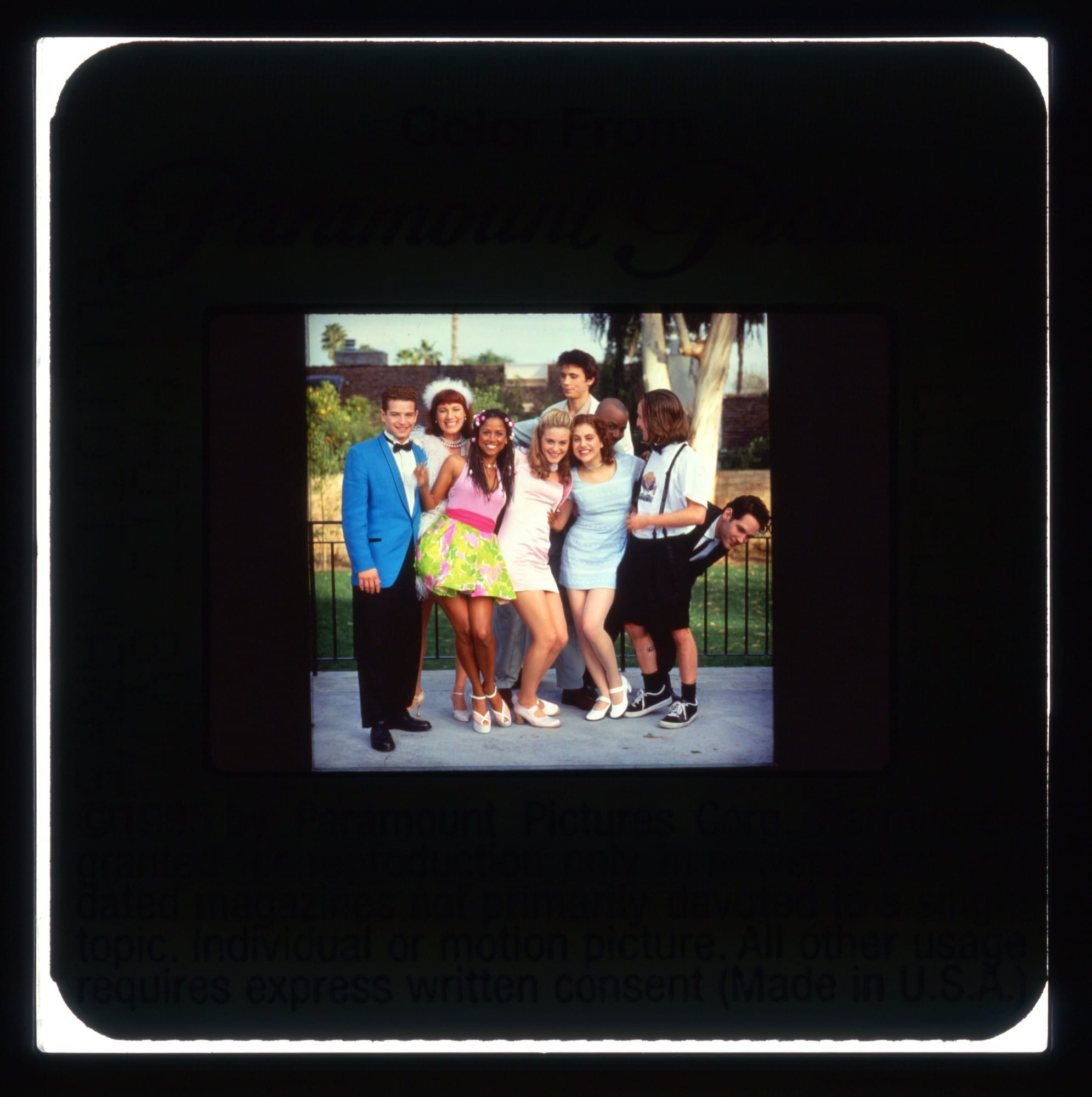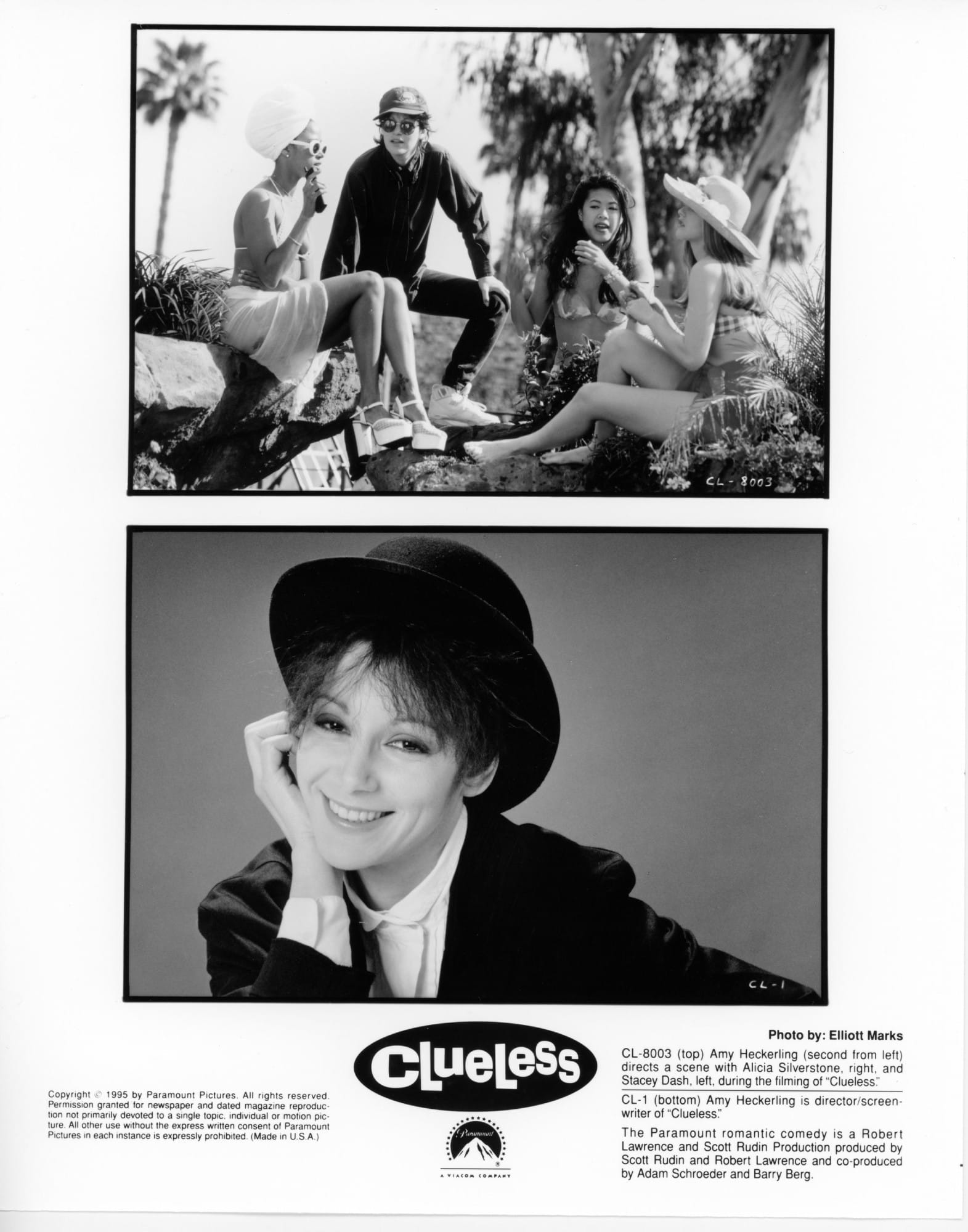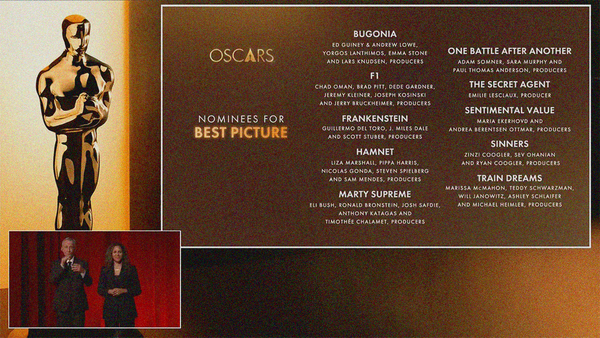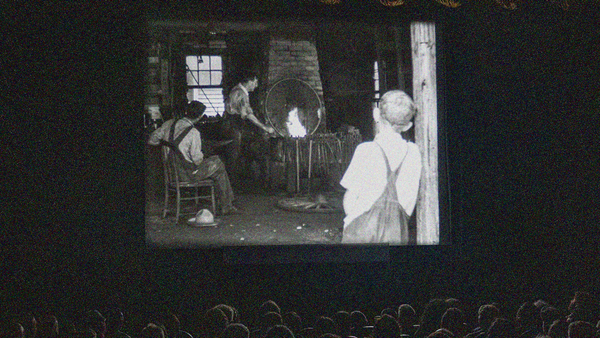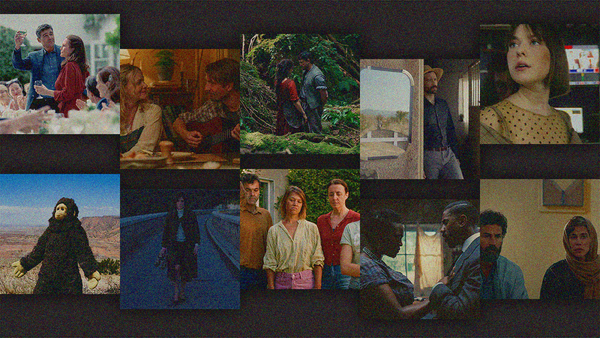Week Ending 7/18/25
Fantasia 2025 - Week One
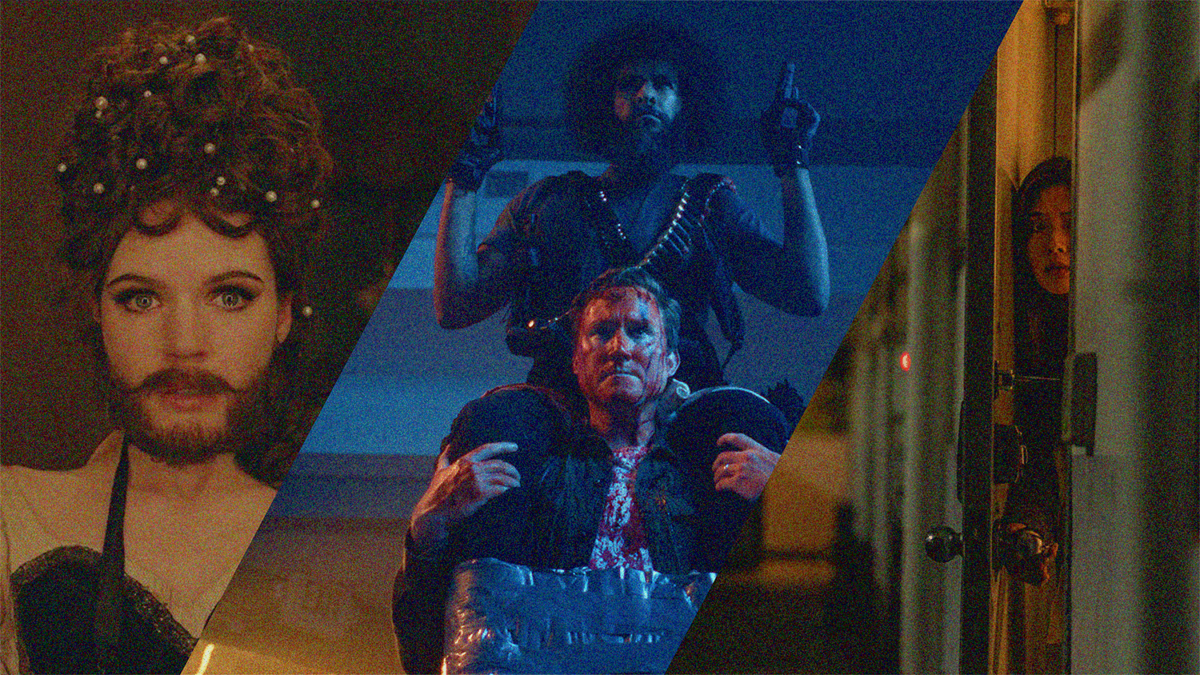
The 2025 edition of the Fantasia International Film Festival has begun and the screeners are coming much faster than they did last year. I'd still rather it be like the years prior to 2023 when we got access a week before the festival, but a healthy deluge two days in advance is better than refreshing the inbox to no avail.
I do my best to request titles in order of screening dates so my reviews aren't going up so far removed from their premiere. That means getting the below three done early to publish right on the heels of their opening week bows while stockpiling a bunch more to watch before next Friday's drop.
The queue currently includes Maya, donne-moi un titre; Terrestrial; The Well; Peau à peau; I Live Here Now; and Hellcat. Here's hoping I get through all of those this weekend in order to request some more so I can keep the Fantasia train rolling through the start of August.
That means next week probably won't include much beyond my festival coverage (although I'm going to try and squeeze a review of Oh, Hi! in, if possible). There's only so much time.

The Bearded Girl
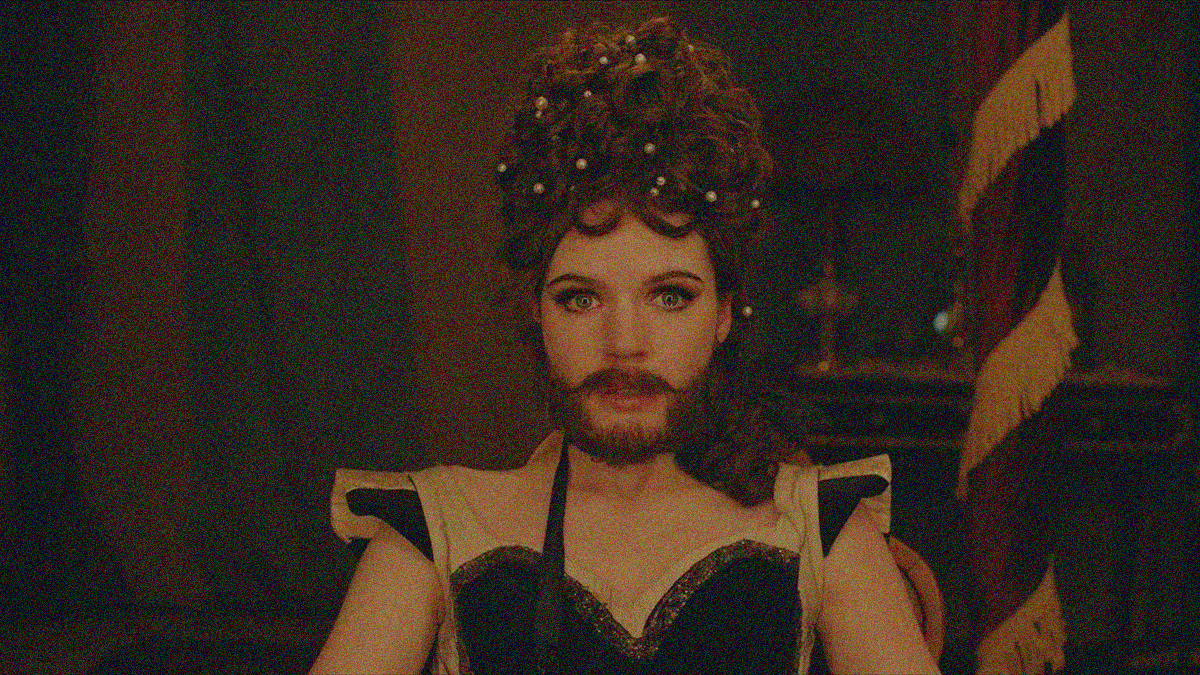
Lady Andre (Jessica Paré) knows what she's doing when asking her daughter Cleo (Anwen O'Driscoll) about her passion. She goes about it wrong considering she leaves zero leeway as far as there being a "correct" answer, but the question remains a necessary one. Because there's a difference between fulfilling a duty and pursuing a career. Sometimes they align (like they did when Andre followed her own mother's footsteps to keep the bearded lady legacy of their family alive), but sometimes they don't. And one must often be given the opportunity to actually choose before discovering which is true. As things stand at the cusp of Cleo's coronation, the "supposed to" factor has her wanting anything but.
This is especially true when comparing the path her sister Josephine (Skylar Radzion) took to find her own best self. Not having the ability to grow a beard as children made her the outcast. As adults, however, being released from the pressure and responsibility of that inheritance proved a godsend by ensuring Josephine's future was hers alone. The tables have therefore flipped now that that purpose has become a chore to Cleo. Maybe she'd still rediscover its fun if able to put her own spin on the tradition, but Andre is too old-fashioned to have that conversation. Parents should pass down their family history, but they shouldn't also dictate how their children carry it into the future.
So, while Jody Wilson's The Bearded Girl (from a story by Blake Barrie and Thiago Gadelha) is mainly about Cleo's journey of self-discovery and identity, there's also a lesson for Andre to realize the time for stifling the next generation's creativity and ingenuity to satisfy one's own comfort is over. There are simply too many alternatives. Too many opportunities to reinvent oneself and escape the staunchly conservative prisons "legacy" often build. Sure, some people will still embrace the security of having their lives mapped out since birth (look no further than Keenan Tracey's Blaze), but most kids these days understand that such uninspired, rote motions will ultimately extinguish whatever fire burns within.
Cleo must leave as a result. If only to show her mother that she won't be bullied into being something she's not. But there's also the reality that her absence might remind Andre that she has another daughter—one better suited to the logistical problems that face a circus troupe at a time when casinos, like the one Dick Sutherland (Jeff Gladstone) is trying to build on their land, are the more attractive sell. It was never a consideration to split up those duties. Nor was it to spice up the act. Andre is simply too stuck in the past to realize that the changing world and status quo isn't about her. It's not a treatise on her era being wrong. It's merely evidence that it has come to a close. That's not a failure. It's evolution.
The queer threads and metaphors aren't therefore a coincidence. What better way is there to comment on society's need to accept and legitimize different thoughts and lifestyles? So, you have drag star Kenneth Wyse playing Madame Tilly, the tarot reader Andre exiled from the show because her vocation was "fake." There's Josephine embracing her sexuality as a lesbian while also fearlessly putting her stamp upon the business. And the analogy of Cleo's beard being something Blaze's father would never welcome into his family—a family of children he cruelly disowned because there was a chance they weren't biologically his. That's a parent whose hold on the future kills progress. We hope Andre might still adapt.
And, all the while, we follow Cleo as she toes the line in-between. She wants to be different as far as it concerns being herself, but she's also tired of wondering whether she's missing out on something because of it. There's a willingness to reject who she really is as a result. To shave her beard and find "normal" love despite the cost that seems to get greater each day she lives that lie. Because the desire to get the cool guy can sometimes lead you astray and force you to ignore everyone telling you that he is without redeemable qualities (including his own grandmother). That doesn't mean a Blaze can't change (Wilson handles his character's complexity very well). It's just not Cleo's job to change him.
Nor is it her job to change herself. Not for him. Not for her mother. Not for society. We should all be able to be whoever we need to be for ourselves without worrying about outside judgement or unfounded fears. Is that the world we currently live in? Absolutely not. But allowing familiar institutions the capacity to grow and better represent that world is what's necessary to maintain hope for the future. That's what the stylized, comedic absurdism of The Bearded Girl provides: a glimpse forward alongside disparate characters finding the conviction to be the example that others can follow. To grab that "Daddy" energy (I can't say I quite anticipated that ending) and refuse to be embarrassed by whatever it is about you that scares the establishment so much.
7/10
Hold the Fort
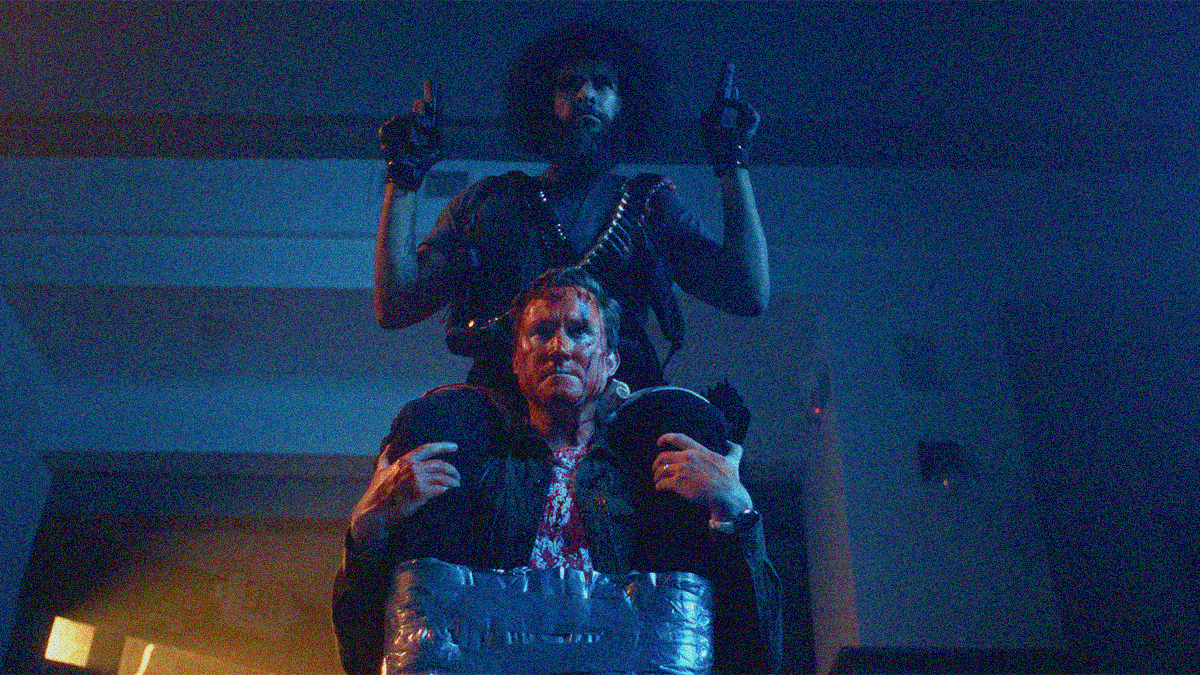
Unlike Sunnydale's perpetually open Hellmouth necessitating the Slayer to defeat demons all throughout the school year, the suburban community built upon the former site of Fort Gruber must only battle its monsters once a year at the Equinox. That's when a portal opens to unleash witches, werewolves, vampires, and more under the leadership of an entity known only as "The Stick Man" (since no one has ever survived an encounter to describe it in full). So, the neighborhood bands together, gathers as many weapons as they can, and lets their hired mercenary McScruffy (Hamid-Reza Benjamin Thompson) save their souls.
This is the straightforward premise behind William Bagley's Hold the Fort and pretty much all you need going in and all you're left with coming out. We receive a prologue to set the stage and then first-time homeowners Lucas (Chris Mayers) and Jenny (Haley Leary) arriving from the city just in time for the annual festivities. Could Homeowners Association President Jerry (Julian Smith) have given them a bit more of a heads up on what's in store? Sure. But then we wouldn't be able to enjoy Lucas' reaction to the carnage. Because Ted (Levi Burdick) can mock him for being a "virgin" all he wants. This nightmarish scenario would probably send you and me running and screaming too.
While its single-locale, defensive front narrative automatically calls to mind other titles from cinematic history, this is neither a gritty thriller a la the classic Assault on Precinct 13 nor a gory, dark drama like a contemporary iteration in VFW. No, Bagley and co-story creator Scott Hawkins are going full comedic splatterfest with their over-the-top characters and goofy execution. Yes, witches and a werewolf do make an appearance, but the main enemies Jerry and his homeowners fight are much sillier in their construction. So too are the means with which they have to dispatch them considering success demands either extreme specificity or a drug-fueled YOLO rampage.
Despite there being a bit of a messaging as far as rolling with the punches when life throws curveballs into your idyllic dreams and the very real reminder to read the fine print before signing what should be an innocuous contract, Hold the Fort leans hard into its style over substance romp DNA to entertain from start to finish without any demand heavier than enjoying the ride. It helps when the chaos kicks off earlier than expected and the usual spiel becomes truncated for brevity in-between rolling regiments of supernatural beasties. Just point your gun, shoot your enemy, and check sentimentality at the door. Hesitate for a second and someone will always get killed.
Bagley knows what he's created and spares no time culling the ensemble since they're value to the fun is greater than their purpose to the story. It allows the actors to let loose with cocaine, giant wrenches, and the corniest of catchphrases while the special effects teams wield carte blanche to destroy the set and continue covering Mayers' face in blood. All we need are our stand-ins (Lucas and Jenny), the hardened exemplars of who they could become (Ted and Michelle L Lamb's Annette), and a leadership combo of unorthodox tactics (Jerry) and brute force (McScruffy). Make sure their shared dynamic puts laughter above authenticity (without sacrificing sincerity) and see where the insanity takes you.
There are unceremonious deaths to shock you. Drawn out deaths to inject some emotion before adding more humor. A coward learning to be brave and a loner embracing community. Sure, the HOA fees are high (stockpiling ammunition isn't cheap), but you can't put a price on genuine camaraderie. It takes some ball-busting, pants-soiling, and adrenaline-soaked homicide to earn that familial bond, but it's worth the trauma when the alternative is having your guts ripped out. And while Hold the Fort might not be for everyone due to its inherent silliness, it won't wear out its welcome at only seventy-four minutes. So, stick around for cut wirework and outtakes during the credits if your smile remains ear-to-ear.
6/10
Noise
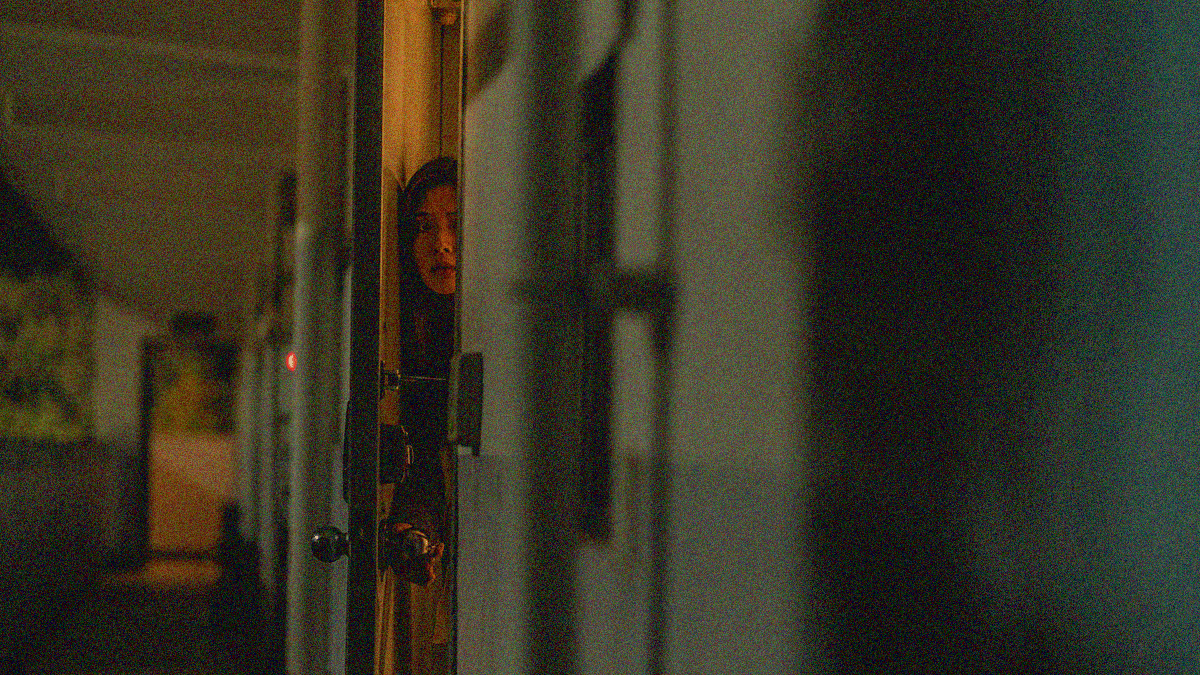
Something is definitely wrong in Ju-hee's (Han Soo-a) apartment complex and it's not just a neighbor stomping their feet. (Although this is a major problem with high-density urban housing infrastruture in South Korea.) Yes, the walls and floors are thin, but could normal sounds truly drive someone insane? Because that's what's occurring with those who can hear it and those who can't. And it's not just that Ju-young (Lee Sun-bin) is partially deaf as a result of a car accident that she can't corroborate her sister's obvious pain. If the racket was truly as insufferable as Ju-hee says, her hearing aids would definitely pick it up. No, it's her sister's increasing rage that ultimately forces Ju-young to leave.
The guilt upon discovering Ju-hee has disappeared therefore proves too much. If Ju-young hadn't moved to a factory dorm, her sister might still be slamming a broom into the ceiling. So, she takes off from work to return and find out what happened since the authorities are unable to act on anything without hard evidence. It doesn't matter that threatening notes are left on the door. Or that the tenant below them in 504 (Ryu Kyung-soo) has sinisterly demanded Ju-young be quiet in the middle of the night. More than police ineptitude, however, this layer of Teflon surrounding the complex seems self-made thanks to the building manager's (Baek Joo-Hee) campaign to silence all troubling rumors in hopes the government passes her reconstruction budget.
Kim Soo-jin's feature debut Noise (written by Lee Je-hui) has a lot going on as a result. There's the mystery of finding Ju-hee that's undertaken by Ju-young and the former's boyfriend (Kim Min-seok). There's the history marred by tragedy hidden within the building's dark recesses that only 804 (Jeon Ik-ryeong) is willing to share if Ju-young keeps her voice down. And there's the thumping sounds, electronic wails, and mumbled gibberish that Ju-hee heard and that now reaches her sister's ears with its original target gone. Is a supernatural entity or ghost out for blood and vengeance? Is there a cover-up unfolding under the watchful eye of the complex's executive board? Could there even be a known murderer on the loose?
While I enjoy the multiple paths the script takes for distraction and complexity, the tapestry formed does suffer from its convolution once we see more than we hear. Because the moment a death occurs as a result of one of those three questions being answered, another gets answered in a way that forces us to question the first. It's one thing to have multiple layers of intrigue and aggression working in tandem, but it's another to have them negating each other in the process. I found myself disengaging because it felt like the filmmakers were simply cutting threads when it suited their current ambition. They do eventually pick some back up later, but even that feels more like the product of convenience rather than elegant storytelling.
Whereas Noise may suffer from structural issues, however, it excels at creating suspense. 504 is a menacing figure with his deadpan dialogue and robotic movements. The specter of a woman in silhouette always watching is sufficiently creepy. And the rotting creature that seemingly hunts them all (whether in reality or their minds) delivers some really nice scares (I loved the scene of its shadowy movements behind fogged glass). Add the dread looming from a broken basement window housing years of unsanctioned garbage and this building's scale increases the horror quotient by constantly expanding beyond just Ju-hee's unit 604. Because she wasn't the only one going crazy. Not in the present nor the past.
I only wish the red herrings were tidier. Some of the lore could have been uncovered earlier so it didn't always feel instantly activated as a replacement for what came before it rather than an augmentation. The supernatural portion could have also been better explained so its violence didn't seem so separated from the human violence that I constantly wondered if I missed something (this also contributed to the grief theme feeling clunky and incomplete). Otherwise, the performances are great (especially Lee Sun-bin and Jeon Ik-ryeong), the gore is memorable, and the sound design will have you thinking your ears are bleeding like those on-screen. The pieces might ultimately eclipse the whole, but they're good enough to make the imperfect marriage a worthwhile experience.
6/10

Drowning Dry
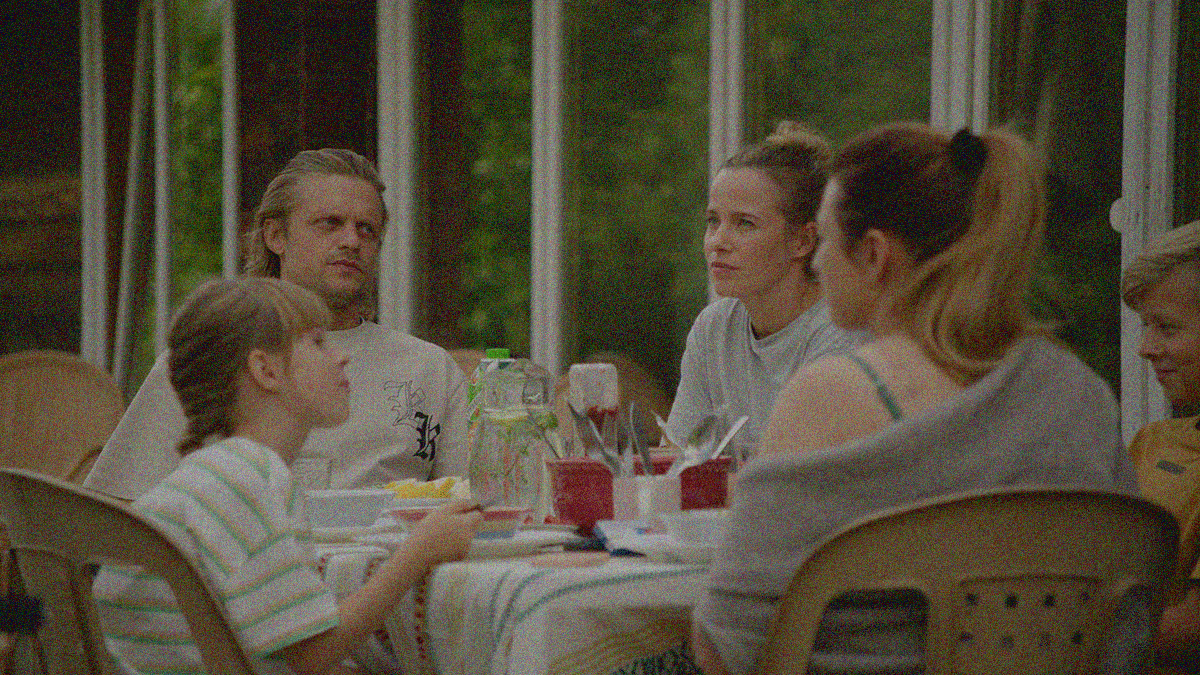
"It’s okay to give yourself to the film’s odd rhythm because that sense of confusion you feel is purposeful. These are fallible people dealing with internal doubts while striving to stay afloat."
Full thoughts at HHYS.
Ironheart – Season One
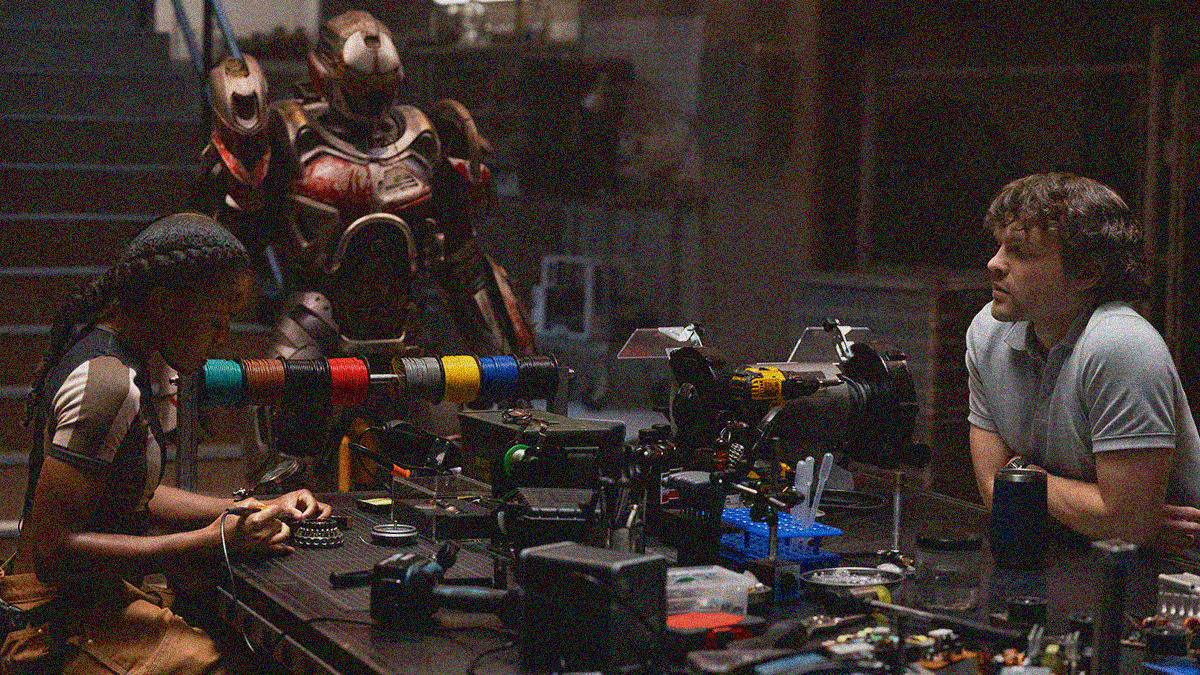
Magic has entered the MCU. Yes, it's been here for a while considering Doctor Strange and his Mystic Arts buddies in Kamar-Taj. But not really. Not as anything more than a means to visually play with physics. No, the magic at the center of "Ironheart" is conversely very, very dark. Evil. Faustian. It's about giving someone the ability to wreak havoc and accrue power ... for a price. For something the recipient "won't even miss."
In this case, that someone is Parker Robbins aka Hood (Anthony Ramos): a criminal mastermind with a loyal lieutenant (Manny Montana's Cousin John), hacker (Jaren Merrell's Slug), demolitions expert (Sonia Denis' Clown), and muscle duo (Zoe Terakes' Jeri and Shakira Barrera's Roz). His plan is to extort ownership in every high-tech Chicago upstart for reasons we don't yet know beyond the millions worth of shares that come with the package. And he accomplishes it with the help of a leather hood granting him invisibility.
All he needs is a tech genius he can trust to put his team over the top and one just happens to have returned home in disgrace. Enter Riri Williams (Dominique Thorne) fresh off an "internship" in Wakanda and an unceremonious expulsion from MIT. Saddled with a one-track mind to finish her Iron Man-inspired suit as a way to ignore the grief of watching her best friend (Lyric Ross' Natalie) and stepfather (LaRoyce Hawkins' Gary) die, she joins Parker under the delusion that relinquishing control over her morality is worth a no-strings-attached injection of much-needed financing.
That's deal number one: Riri becoming a criminal to assist her goal of becoming a hero (if not for the world, at least for her mom, played by Anji White, and romantic interest Xavier, played by Matthew Elam). Deal number two is believing the health benefits of accidentally bringing Natalie back to life as her suit's AI outweigh the potential for even worse anguish upon realizing she can only kick the can on accepting her death so far. And deal three arrives via Joe McGillicuddy (Alden Ehrenreich). It starts with blackmail, but he eventually agrees to risk his own freedom by blindly trusting Riri at her word.
Deal number four is the one that concerns magic because Parker's prowess with the hood comes at a cost. What that is ... we also don't yet fully know. We merely see it manifesting as black scars branching out over his body like infected veins. Every time he uses the hood, the scars and pain grow. Perhaps it's even affecting his demeanor as the partnership he began with John gradually turns into a dictatorship and the family he's cultivated with his crew becomes a lot more transactional once their lucky streak starts hitting some snags. Who or what is behind it? Well, consider Riri's attempt to find out deal number five because the price paid by everyone else for her trouble couldn't be higher.
It's a lot to juggle in under six hours. Credit Chinaka Hodge for mostly making it work, but it's hardly a flawless job. There are simply too many characters involved to not feel rushed. And I haven't even mentioned sorcerer-in-training Zelma (Regan Aliyah), Parker's mysterious benefactor (Sacha Baron Cohen), or someone I did mention being revealed as someone else. It's moving so fast plot-wise that I didn't even clock Xavier was Natalie's brother until halfway through the series. I initially thought Natalie was Riri's sister before that got cleared up. Then I thought Xavier was Natalie's boyfriend before that got corrected. This thing needed ten episodes.
I get it, though. None of that stuff matters where it concerns Riri needing to prepare herself to take Parker down. The others are simply friends and foes along the journey. But they're also some of the most intriguing characters we've received in the MCU since Eternals and they deserve some time of their own to breathe. It's why I wish Marvel Television would slow things down. Give us a series with this many people, but allow them equal life with dedicated episodes a la "The Bear" or "Lost". Not every new MCU chapter must strictly adhere to pushing us forward. It's why I enjoyed "Agatha All Along" so much. They let that one exist. "Ironheart" is more: "Let's refresh as much dormant IP as possible."
That's fine for entertainment purposes, so I did enjoy the ride. There's some real emotionality as Riri copes with loss and attempts to dig herself out. The heists in the first half are elaborate and fun. And the White Castle fight in "Karma's a Glitch" was fantastic. But I totally disengaged the moment the mid-credit stinger ended after the finale. I found myself less interested in digging into what I just saw then hypothesizing where it connects later to Secret Wars. So, like most of the post-Endgame fare, it's ultimately a commercial for bigger possibilities. How can it not when the final episode is the shortest (by ten minutes) while also introducing more questions than answers?
6/10
The Last of Us – Season Two
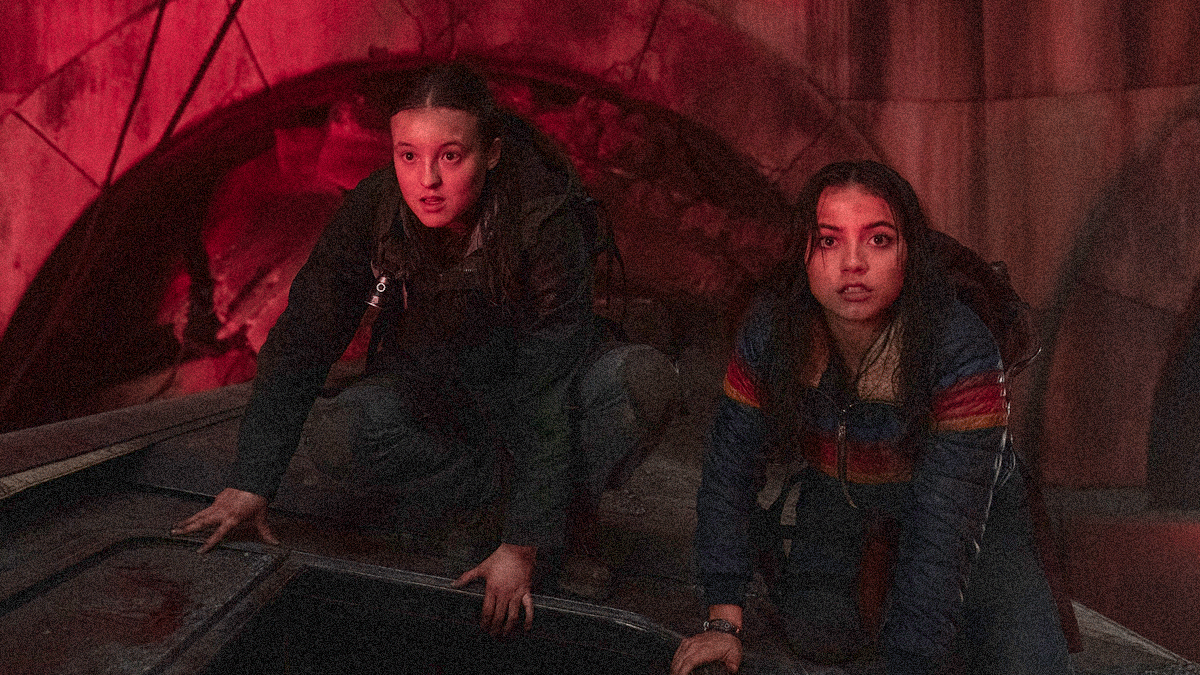
Five years is a long time to carry the secret Joel (Pedro Pascal) keeps from Ellie (Bella Ramsey) at the conclusion of the first season of "The Last of Us". So long that we quickly presume it has a lot to do with the rift between them at the start of season two. Joel is trying to engage with her, but she barely acknowledges his presence when not holed up in her garage apartment. It's become so bad that he's even seeing Jackson's resident psychotherapist (a great Catherine O'Hara) to figure out if there's a way to make things better regardless of whether their bond will ever again be the same. Because once that Salt Lake City cat's out of the bag, it's never going back in.
Look no further than Abby (Kaitlyn Dever) to discover this truth. She's the daughter of the doctor Joel killed. The one who was going to attempt making a Cordyceps vaccine out of Ellie's brain. Those five years of knowing what he did drove her to dedicate her very existence to killing him. It did not matter how long it would take; Abby would not rest until Joel was dead. So, she and her friends joined the WLFs, learned to fight and hunt better than even the Fireflies could, and waited until the opportunity arose. You almost can't deny her performing the deed either when fate and justice merge to present a perfect road forward. An eye for an eye. No more, no less.
Therein lies the first two episodes of the season. Five years of calm exploded and five years of hate hardened on a collision course. The rest? Consequences. Because the problem with eye-for-an-eye vengeance is, of course, that it can never work unless the owners of those two eyes are the ones killing each other. If not, there's always another new eye opening itself up for destruction. Joel killed the doctor and lived. So, if Abby were to kill him and live, it would only make sense someone would hunt her much the same way. And she'd have no leg to stand on to say it's unfair since her very existence as a target is a result of her saying it was her only fair thing to do. Round and round the cycle goes.
As such, there needs to be more to the story. Enter the Scars. A group of Amish-like people devout to a prophet who had a vision that explained Cordyceps as a new flood meant to wipe away humanity's sins. They shun technology and seek to live off the land with bows and arrows as farmers and gathers in their forest home within Seattle. Well, Seattle is also the home of the WLFs—a paramilitary group whose numbers continue to increase every single time Craig Mazin and Neil Druckmann turn their focus upon them. David versus Goliath in a brutal battle sparing no quarter for the enemy on either side. It's a war between families, much like Ellie versus Abby. Murder in the name of protection. Tribalism at its worst.
We saw a little of that in season one with Kathleen's (Melanie Lynskey) rebels pretty much turning into the very thing they fought against (FEDRA). It's on an even bigger scale here because the WLFs didn't simply spend all their time torturing conspirators in their tiny community. No, they sought to expand. To, for all intents and purposes, remake the world in their martial law image. The oppressed becoming the oppressor. Victims stockpiling enough power to ensure they would never be victims again. But the only logical end to that impulse is to create a replacement for the label. Fascism 101: target someone else so that no one else has the time to target you because it's easier than accepting the reality that, once the latest group gets erased, you might very well be next.
It's what happened during the Holocaust as Nazis sought to take over Europe. It's what in turn is happening now with the Israeli Zionist ancestors of those victims dehumanizing Palestinians to take over the Middle East. It's every genocide. And it's apparently ingrained in our DNA. Because rather than joining forces to destroy the Cordyceps, the humans in "The Last of Us" more or less adapted to its presence and decided to seek taking control of what was left. It wasn't enough for the WLFs to let the Scars live in peace. Or vice versa if we're to assume both were equal opportunity aggressors rather than one being pushed to the point of needing to fight back in kind. I'm not familiar with the video game source material and mythology, but it's not difficult to posit the Scars' are here due to self-defense.
That brings us back to Ellie and Abby and their cycle of violence. Did Joel go overboard? That depends on whether you think he could have talked them into letting Ellie go. I find that hard to believe, so his actions inherently become an unavoidable cost of survival (although him knowing she would have willingly sacrificed herself definitely muddies the picture). Is Abby going overboard in her pursuit of Joel? No doubt about it. Because her father is already dead. And neither Joel nor Jackson poses a threat. Abby acts out of desire. Pleasure. That's the thing about Joel, Ellie, Tommy (Gabriel Luna), and the other "good guys" of post-apocalyptic narratives. They don't mind spilling blood, but they never seek it. Abby, though? She lives for it. At least the version we know does.
This season is quite timely as a result. It really digs into the nature of one side's freedom fighters being the other side's terrorists. The more you stop seeing your enemy as a human with the exact same impulses and motives as you, the less human you become. It's why the supporting cast proves a lot more important here than in the previous season. We need Mel (Ariela Barer) as a balm for Abby's cruelty and Dina (Isabela Merced) and Jesse (Young Mazino) as one for Ellie's selfishness. Yes, Ramsey is very good at being her own conscience once guilt and shame arise in the aftermath of what she ultimately does throughout this chapter of her journey, but that's partially an extension of her also being that for Joel. The justifications simpler grow hollower with each subsequent episode.
I think the drama is as effective as it was in the first season as a result. The ways in which these characters wrestle with their morality is why I keep coming back and the show does not disappoint. The structure, however, can't help feeling like it's missing something. I loved the way we were able to really get to know Bill and Frank or Kathleen or even Pastor David. They didn't feel like faceless figures to be used as expendable pawns to the story even though that's exactly what they were. They felt whole. Because season two is so myopic in focus insofar as Ellie hunting Abby for revenge, those peripheral figures lose some autonomy. Besides Dina, the rest are rapidly introduced to kill, die, or save. The acting remains stellar (Jeffrey Wright, Tony Dalton, and Joe Pantoliano shine), they just also serve Ellie.
That's okay. I was still riveted throughout and am genuinely intrigued with how the story continues considering the finale. If season one wasn't as good as it was, maybe I'd be lauding this one with the accolades I gave it. Everything is relative, though, and nothing exists in a vacuum. And while the cliffhanger is quite similar to its predecessor—Joel took Ellie to Salt Lake City as promised and Ellie found Abby as planned with neither quest turning out quite the way they hoped—this one does leave us wanting whereas the first could have simply left us lingering in its bleak result. That's the problem with adapting the first game as a single season before choosing to split the second into many. You intrinsically leave us needing more instead of demanding it.
8/10
No Sleep Till
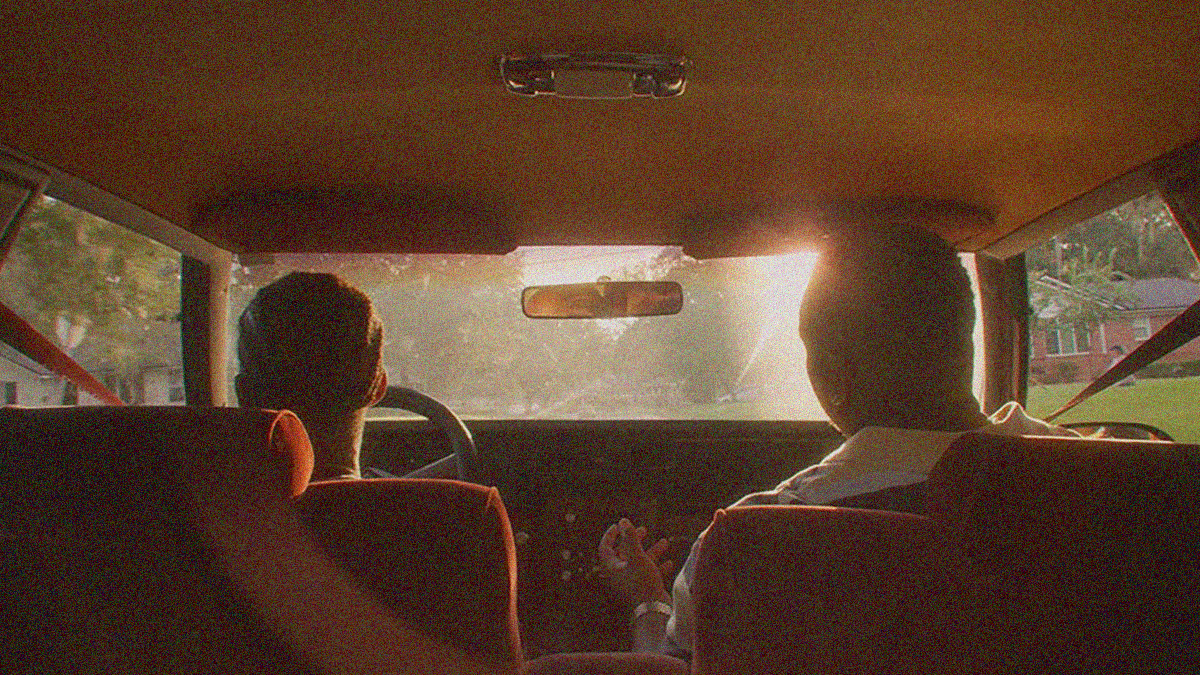
"It's a quiet piece with gorgeous shot set-ups and interesting characters engaged in the seemingly wild juxtapositions inherent to maintaining a mundane status quo through the uncertainty of impending chaos."
Full thoughts at The Film Stage.
Saint Clare
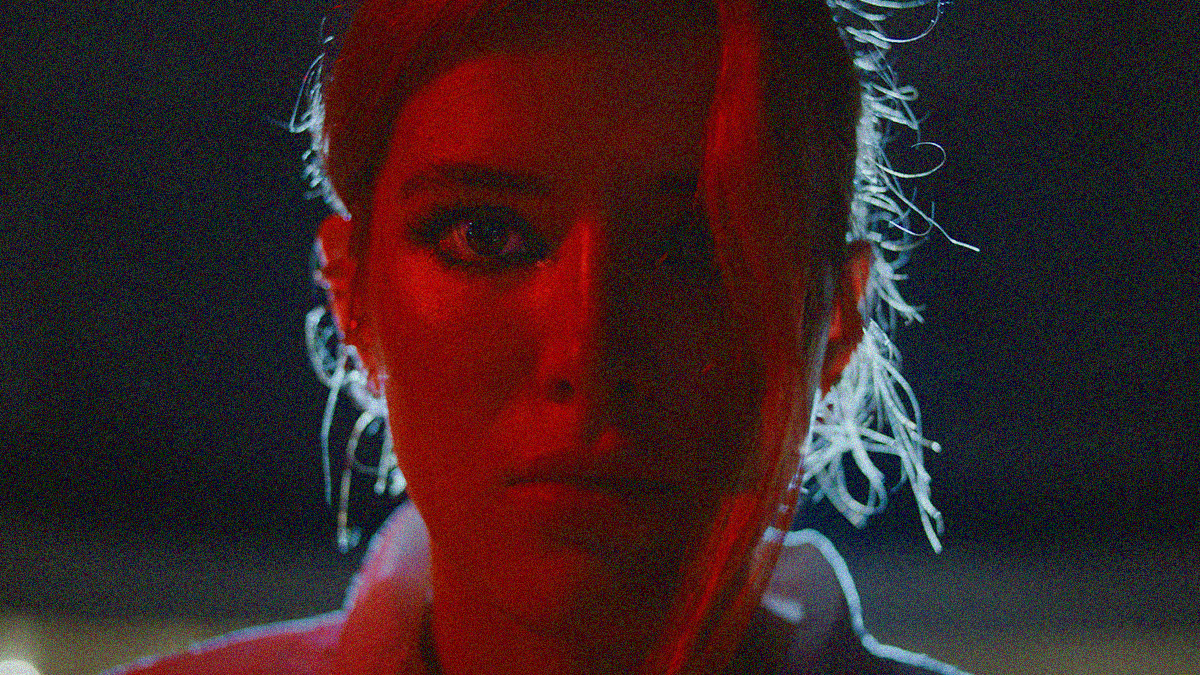
Her first murder was an act of self-defense. What should have hailed this pre-teen as a hero, though, also had the potential to mark her as a monster. And yet her victim was a bad man hellbent on killing every girl on her camping retreat. The same goes for each subsequent victim she's become highly adept at making look like suicides too. So, despite what the world might believe (and she often believes it too), Clare Bleecker (Bella Thorne) mustn't stop. Just like Joan of Arc before her, she's doing the work of God. She's ridding society of misogynists, rapists, and murderers of innocent people. Only when caught will she know her service to God has been fulfilled.
It's an intriguing premise that author Don Roff has fashioned into a book series about to receive its fourth installment. Everything I see about the novel bills it as a darkly comical teen romp—the "love child of Faith from Buffy and Dexter Morgan." The film, however, avoids all mention of "comedy" to lean solely into the mystery thriller aspect of its subject matter: a four-decades-old string of local disappearances wherein the bodies of the young women taken were never recovered. While shifting tone isn't necessarily a mistake, director Mitzi Peirone and co-writer Guinevere Turner's Saint Clare is at its best when it's not taking itself so seriously.
Case and point: Mr. Edwards (Joel Michaely). Despite the tragedies befalling this community, he's undaunted about mounting a gender-bending adaptation of Deathtrap. Over-the-top flamboyant and disinterested in anyone who dares be out of synch with his demands, his presence serves as a balm against the otherwise dour whodunnit that simply never pops. Part of this is the messy nature in which that mystery unfolds (the red herrings sprinkled throughout prove more akin to plot holes since the truth rarely ever explains their maybe roles in the crime beyond a final, final reveal that provides partial cover without bothering to fully make it all make sense). The other part is an overall sense of incompleteness where it concerns our protagonist.
There are allusions to Clare having dissociative personality disorder, but it is neither elaborated on or mentioned—unless you count her admitting she blacked out during Detective Timmons' (Ryan Phillippe) interrogation and remembers nothing about it. She talks to the ghost of a prior "victim" (it's difficult not to use quotes when discussing Frank Whaley's Bob after discovering how he died), but he's less a "personality" than embodiment of her conscience. And, despite constantly repeating the mantra that everything she does is in service of God, we never receive clarity about this so-called piousness. She prays once and has a hallucination, but this aspect is just another seemingly important piece of the character's mythology that we're merely asked to take on faith ourselves.
I'd be more inclined to do so if Saint Clare allowed itself to be as absurd as Mr. Edwards. Because a film can't take itself as seriously as this one without an airtight plot I can meet at its level. If you're able to laugh at yourself, however, I can excuse the flimsy narrative connections and wild leaps forward without presenting Clare's thought process from point A to B. There's a laughable sequence that moves from her confronting a fellow student (Jan Luis Castellanos' Truman) in a dark room to her grandmother (Rebecca De Mornay's Gigi) confronting him at a vigil to Clare suddenly being in the belly of the beast. Instead of letting us laugh at the overwrought melodrama, the film truly believes it provided crucial exposition when it could have just jump cut over Gigi entirely.
It's too bad because I'm a big fan of Peirone's debut Braid. That's why I sought this one out. It embraced leaving plausibility behind so well that its weird this one isn't benefitting from the same. Because it has its merits. Whaley and De Mornay are great. The reveal of who's behind the sex trafficking plot probably shouldn't have surprised me as much as it did, but I must give credit for doing so anyway. And, while effective in the lead role, Thorne would have killed it if given a bit more leeway insofar as allowing her earnestness to play for intentional laughs. Because her classmates earned too much unintentional laughter with dialogue that made it seem there was a non-zero chance Saint Clare would be revealed as a stage play itself. That kind of fourth wall breaking would have been welcome.
4/10

This week saw The Arrival (1996), Caddyshack II (1988), Concussion (2015), Drop (2025), Hard Country (1981), It Lives Inside (2023), Mike Wallace Is Here (2019), My Sister's Keeper (2009), The Perfect Score (2004), and Pitch Perfect (2012) added to the archive (cinematicfbombs.com).
Randy Quaid having a ton of fun dropping an f-bomb in Caddyshack II.

Opening Buffalo-area theaters 7/18/25 -
• Bad Shabbos at Dipson Amherst
"Credit the filmmakers too for never holding piety above the absurdity of the premise. The goal is to show how much this family loves each other, but that shouldn’t erase the fact they can still also be bad people." – Full thoughts at HHYS.
• Don't Let's Go to the Dogs Tonight at Regal Transit, Quaker
• Eddington at Dipson Amherst, Capitol; AMC Market Arcade; Regal Elmwood, Transit, Galleria, Quaker
• Ekka at Regal Elmwood
• I Know What You Did Last Summer at Dipson Flix, Capitol; AMC Maple Ridge, Market Arcade; Regal Elmwood, Transit, Galleria, Quaker
• JUJUTSU KAISEN: Hidden Inventory / Premature Death - The Movie at North Park Theatre (select times)
• Junior at Regal Elmwood
• Kill the Jockey at North Park Theatre (select times)
• Kothapallilo… Okappudu at Regal Elmwood
• Saiyaara at Regal Elmwood
• Sarbala Ji at Regal Elmwood
• Smurfs at Dipson Flix, Capitol; AMC Maple Ridge, Market Arcade; Regal Elmwood, Transit, Galleria, Quaker
• Tanvi: The Great at Regal Elmwood
Streaming from 7/18/25 -
• Almost Family (Netflix) - 7/18
• Follow (Prime) - 7/18
• I Love You Forever (HBO Max) - 7/18
• I’m Still a Superstar (Netflix) - 7/18
• Wall to Wall (Netflix) - 7/18
• The Assessment (Hulu) - 7/19
"Regardless of whether The Assessment bit off more than it could chew, I did still enjoy it. The themes are sound, if also somewhat overt. The production design is amazing. And the acting keeps us engaged throughout." – Full thoughts at The Film Stage.
• Trainwreck: P.I. Moms (Netflix) - 7/22
• Barbara Walters Tell Me Everything (Hulu) - 7/23
• Until Dawn (Netflix) - 7/24
Now on VOD/Digital HD -
• How to Train Your Dragon (7/15)
• M3GAN 2.0 (7/15)
• Sweet As (7/15)
"Clerc presents their journey towards enlightenment with a welcome authenticity by never judging her characters or dismissing their fallibilities. These kids are harboring a wealth of rage and emotions." – Full thoughts at The Film Stage.
• We're All Gonna Die (7/15)
• ZombieCON Vol. 1 (7/15)
• The Banished (7/18)
• Bride Hard (7/18)
• Finally Dawn (7/18)
• Guns Up (7/18)
• Saint Clare (7/18)
Full thoughts are above.
• Woken (7/18)

Pieces from the Clueless (1995) press kit.
